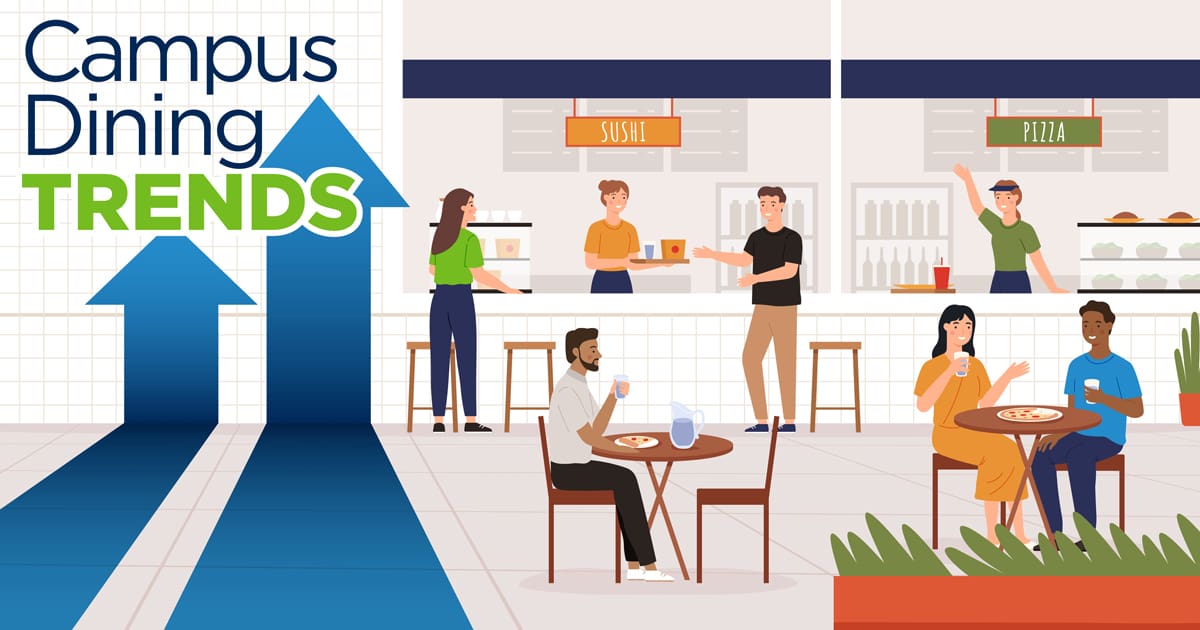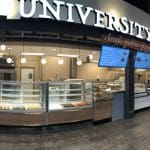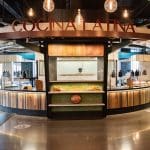Whether you're serving students by the hundreds or thousands, LTI has the ideal serving line…
The New Wave of Campus Dining: A Student-Centric Approach

LTI sits down at the table with University of Massachusetts Amherst Dining Service’s Garett DiStefano and Alexander Ong
At universities across the country, college students are progressively savvier and selective when it comes to the campus dining experience. The days of traditional university dining halls with drab old-school utilitarian cinderblock, boring meals and hard plastic cafeteria seating have fallen from the wayside altogether.
The modern student of today has very specific expectations. College diners want access to an innovative campus foodservice program that reflects today’s values and enhances the overall university experience, all while providing a variety of healthy and sustainable choices.
So, how do university foodservice teams ante up to such high expectations? Voted the best dining program in the nation six years in a row by the Princeton Review, University of Massachusetts Amherst’s campus dining gurus Garett DiStefano and Alexander Ong sat down with LTI to discuss what’s shaping the future of dining of dining on campus, in 2023 and beyond.
Here are some of UMass Amherst’s crowd-pleasing ingredients for success in campus dining excellence.
Customization is king
With an increasing focus on student wellness and satisfaction, the customization of food choices has become key to quality campus dining programs. “Our driving goal is to make dining an experience for students and to deliver it in a manner that is diverse and flexible,” said Garett DiStefano, director of dining for UMass Amherst.
Customization allows students to make choices that align with preferences and in some instances, dietary requirements. It also allows for greater creativity and experimentation in the kitchen, which is an important ingredient for enhancing the dining experience and generating return customers.
Read more about how LTI offers dining customization options for foodservice operations.
Technology is not always a good thing
As foodservice technology continues to advance dramatically, from robotic deliveries to unmanned markets, it might be surprising to learn that not all technology is good technology.
When UMass Amherst initiated a kiosk ordering system in certain dining locations, they quickly discovered the students did not take to it as expected. “They wanted interaction with foodservice staff and special customizations from a real person,” said DiStefano. “This is what’s truly valuable to them. Remote ordering just didn’t sit well. And so, we learned from that mistake.”
DiStefano noted that there is a high demand for personal interaction within foodservice programs, including seeing the food in front of you and choosing customizations, even if it’s not on the menu. “Technology can be useful, but it should not be a crutch,” said DiStefano.
Read how LTI’s VisionDesign services can help personalize the dining experience for students.
Modernizing equipment is no longer an option
With staffing shortages and supply chain issues still afflicting campus dining programs across the country, the utilization of modern, flexible equipment is crucial to success. “You simply can’t make cuts on equipment, as it’s proven to have a trickle-down negative effect,” said DiStefano. “If you don’t have a station open, less people will be served and your revenue stream will suffer.”
The UMass Amherst dining program depends on LTI’s QuickSwitch convertible food wells to create efficiencies while maximizing the student experience. “Where we used to need three separate units for hot, cold and frozen, we have replaced with all-in-one QuickSwitch units,” said Alexander Ong, director of culinary excellence at UMass Amherst. “It’s provided us with the ability to quickly adapt our stations to changing menus or supplies.”
With the use of QuickSwitch units, dining programs can streamline processes and reduce dependency on staff members with just one employee who can handle hot, cold or frozen options in the serving line.
Watch how UMass Amherst transformed its serving line to offer amazing hot, cold and frozen creations – side-by-side.
Socialization and wellbeing are intertwined
Eating together in common areas provides students with the opportunity for casual conversations, sharing experiences and bonding over common interests, which contributes to a sense of belonging and wellbeing. In turn, this can have a positive effect on academics and overall success.
“This is especially important in this post-pandemic era,” said Ong. “Students finally have the chance to bond in person again, and we are seeing a greater desire for those connections than ever before.”
Options, options — and more options
Although many students express the desire for social interaction in a casual dining setting, many others many just not have the time to eat in standard venues during normal hours.
“In addition to four residential dining locations, we offer alternative options such as food trucks that move around the campus, Panera-style cafes and eateries, grab-and-go options, event catering and concession stands at sporting events,” said Ong. “We’re constantly evaluating how to get more options into more spaces and optimize efficiency while doing so.”
Watch how LTI upscale grab-and-go units can boost revenue streams for foodservice operations.
Keep student feedback top of mind
The UMass Amherst dining program has incorporated the use of student ambassadors and focus groups to solicit feedback on an ongoing basis. “We use student ambassadors to talk frankly about needs and perceptions,” said DiStefano. “Being continually reactive to their wants and needs is one of the key factors in keeping our foodservice penetration rate at 92% — which is 30% above the national average.”
Getting students involved with dining initiatives has helped to bolster staffing numbers for UMass Amherst. DiStefano notes that an exceptional dining experience can be a handy recruitment tool, attracting undergraduates to seek employment within the campus dining program.
Sustainability is systems-based approach
The UMass Amherst dining program’s motto is “local, healthy, sustainable and delicious.” While many in the foodservice profession have a decent understanding of what is meant by sustainable food sources, it is equally as important to evaluate a university dining program’s entire process to identify inefficiencies and potential improvements.
This type of evaluation involves an assessment of energy consumption, from building materials and lighting, to the recycling of low-VOC materials, and even the creation of mini-efficiencies wherever and whenever possible.
“We made the switch to electric golf carts for running supplies between our foodservice hubs,” said Ong, as an example. “We no longer need to load a truck and run it across campus. It reduces fuel consumption and saves a lot of staff hours.”
The road ahead
It’s important to institute a system that fosters the continual improvement of campus dining programs to remain abreast of trends, and more importantly, to listen closely to the wants and needs of the ultimate end user: the students.
“Success is never final for us,” said DiStefano. “We are constantly evolving and improving our programs. It’s the key to the road ahead.”
Read more about how you can put LTI’s QuickSwitch technology to work for your foodservice operation! Contact us today for more information.



